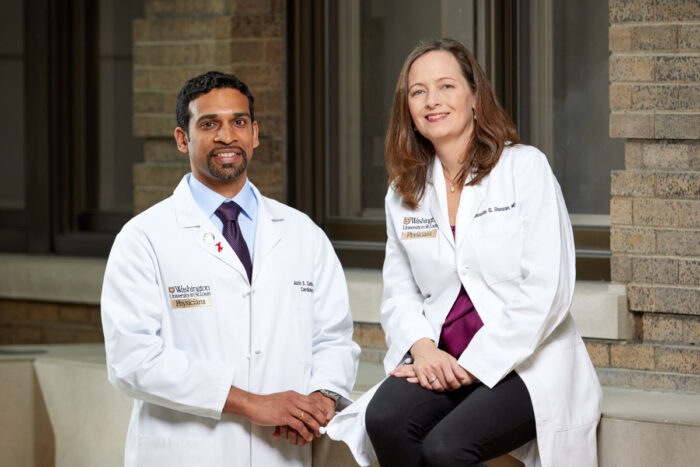Duncan, Sadhu named Loeb Teaching Fellows
Focuses will be on pediatric curriculum, EKG training
 Matt Miller
Matt MillerJustin S. Sadhu, MD, and Jennifer G. Duncan, MD, have been named the 2019-21 Carol B. and Jerome T. Loeb Teaching Fellows at Washington University School of Medicine in St. Louis. Established in 2004, the two-year fellowship provides recipients extra time to focus on implementing innovative ideas to enhance the education of medical students and residents.
Jennifer G. Duncan, MD, and Justin S. Sadhu, MD, have been named the 2019-21 Carol B. and Jerome T. Loeb Teaching Fellows at Washington University School of Medicine in St. Louis.
The fellowship program was established in 2004 with a gift from Carol B. and Jerome T. Loeb to advance clinical education. The program also is supported by The Foundation for Barnes-Jewish Hospital. The two-year fellowship provides recipients extra time to focus on implementing innovative ideas to enhance the education of medical students and residents.
“The Loebs have been tireless champions of education on the Medical Campus,” said Eva Aagaard, MD, senior associate dean for education and the Carol B. and Jerome T. Loeb Professor of Medical Education. “These fellowships are one aspect of that generosity and commitment, and have been a primary driving force in the career development and support of educators on this campus. Drs. Duncan and Sadhu are outstanding educators who have put forth truly innovative proposals that will improve medical education.”
Duncan, an associate professor of pediatrics, will focus on developing a well-rounded curriculum for pediatric subspecialty trainees that offers career-specific lessons in clinical and academic skills, professional advancement and personal wellness. Examples include sessions on physician burnout, delivering bad news to patients, bioethics and clinical teaching.
Each year, the Department of Pediatrics trains over 80 fellows in 16 different clinical subspecialties.
Duncan’s curriculum also allows for trainees to gain additional education in their areas of interest. For example, those focused on basic research may take classes on managing a lab or advanced grant writing, while those aspiring to teach may participate in sessions about adult-learning theories or curriculum development.
“I am excited to move beyond the current one-size-fits-all approach to a more tailored, career-driven educational experience for our trainees,” said Duncan, program director of the Pediatric Critical Care Medicine Fellowship. “This curriculum will address overall needs as well as dive deeper into developing skills required for specific career paths. My goal is to give them a strong toolbox for transitioning into the next stages of their careers. Additionally, I believe that many of the resources we develop will be applicable to other specialties at Washington University and beyond.”
Sadhu’s fellowship will aim to revamp the electrocardiogram (EKG) curriculum. EKGs are a low-cost, widely available diagnostic and screening test. However, Sadhu said national studies have shown that medical students struggle with EKG interpretation.
“Given the medical school’s ongoing curriculum renewal, it’s imperative to ensure our students are adequately trained to interpret EKGs,” said Sadhu, an assistant professor of medicine in the Cardiovascular Division and a co-director of a cardiovascular course for medical students. “Being able to interpret accurately an EKG is a fundamental but sometimes overlooked skill relevant to graduates entering fields such as internal medicine, emergency medicine, family practice, general surgery and anesthesiology. I am excited about helping our students gain confidence and proficiency with this valuable skill.”






